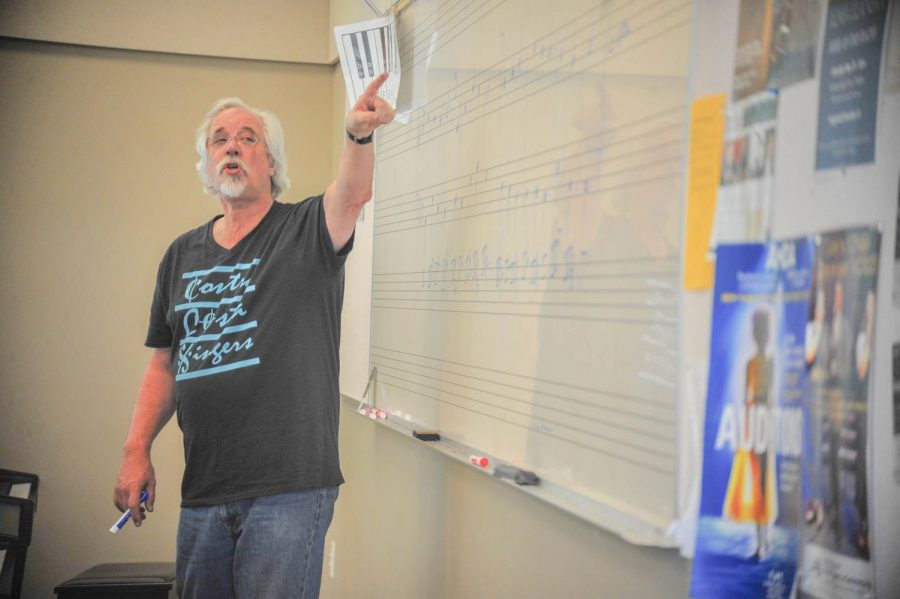Wayne Organ to retire after impactful 22 years
Career fuels passions through musical education, campus leadership
Music professor Wayne Organ teaches a piano class in the Music Building Friday. Organ will be retiring at the end of the 2018 spring semester. He said he is excited to have more time to play in a band.
Apr 24, 2018
For many, the foundation of a successful life consists of a quality education, lucrative income and the will to navigate a world that holds a high priority on making a living, even if the job isn’t a person’s true calling.
It’s rare in life’s social and economic constructs to be able to combine your passions with a career that has the potential to change the lives of those you encounter.
For Contra Costa College music department Chairperson Wayne Organ, taking his passion of music and turning it into a 9 to 5 career may have been pure luck. But to flourish in it was no accident.
“My dad once told me, if everything was paid for and you didn’t have to do anything for anything, what would you do? And if you can make that your job, you will never work,” Organ said.
“I’m a successful example of that. I’m in a unique position where my hobby and job are the same thing.”
After 22 years of playing a fundamental role in shaping the dynamics of CCC, Organ will be retiring at the end of the spring semester.
“When I got hired I thought I was getting a job, and what I got was a family,” Organ said. “The relationships I built over the years are as close in a lot of ways to any family members I have.
“That’s the thing I think I’m going to miss the most — being a part of something bigger than yourself. That’s nice to be a part of.”
Teaching for two years at Solano Community College before finding a home at CCC in 1996, Organ manifested his pioneering personality and talents into leadership roles felt by faculty, staff and students on campus.
“One of the nice things about being a teacher at a community college is there’s never any doubt that what we do is really important in the bigger scheme of things,” he said. “Watching students start from nothing and realize their incredible musical abilities and watch that grow — that’s what I live for.
“And for those of us who are infected with music, this is the most joyful thing you can do.”
In 1972, after two years studying conducting at Saddleback College in Mission Viejo, California, Organ transferred to Sonoma State University where he would spend eight years in a transitional period.
Although not much of a musical player at the time, Organ absorbed the theory and culture of music by immersing himself in courses that revolved around music.
“Then something remarkable happened, which I still owe everything to,” Organ said.
In 1979, Tom Hemphill, who was the principal percussionist for the San Francisco Symphony, came to Sonoma State to teach a master class, which Organ attended.
After having all of the students play, Hemphill, who was one of the best percussionists in the Bay Area, came over to a financially-strapped Organ to ask who he was studying with.
“He said, ‘Here’s the deal, if you can make it down to my house in Noe Valley in San Francisco and you’re never late and always prepared, I’ll teach you for free,’” Organ said. “Pretty much, I owe everything to Tom. That created a debt — a psychological debt — that was never going away and I recognized I had to pay it (back).”
From building the music department back up from its diminished state upon his arrival on the San Pablo campus, to making decisions about the college’s accreditation in his role as Academic Senate president, Organ has been an instrumental person on campus.
“When I came here, it was just me (as a full-time professor) and a department that hadn’t done much in years,” he said. “This became a unique department in that we are very cooperative and we kind of all take a little bit of a role in the development of students. It’s a very student-oriented program.”
Organ started the music theory program, which wasn’t available before his arrival.
Now students can take up to four semesters of music theory with the possibility of achieving an associate degree.
CCC music performance director Stephanie Austin said, “He (Organ) has been involved in every departmental development plan for over 20 years, including lobbying to gain a second full-time faculty position, creating the recording program, overseeing the Music Building remodel and speaking on behalf of the arts on the department, division, college and district levels.
“He is very good at communicating ideas with and to people. He inspires colleagues to dream and pursue ideas.”
As Academic Senate president from 2010-14, Organ helped the college earn an excellent 2014 Accreditation Report. He worked on the Strategic Plan for the college, worked on the affirmation and development of the college’s Mission Statement and started the reform of Program Review on campus.
“(Organ) brought a creative and artistic approach, not only to his students, but to shared governance,” current Academic Senate President Beth Goehring said. “He’s always willing to step in and step up no matter what you ask of him.”



Janet (Alexander) Williams • Dec 2, 2021 at 3:46 am
Mr. Organ was one of my favourite teachers at CCC. I hope he’s still making amazing sounds and enlightening everyone with whom he meets. I miss his brain. <3